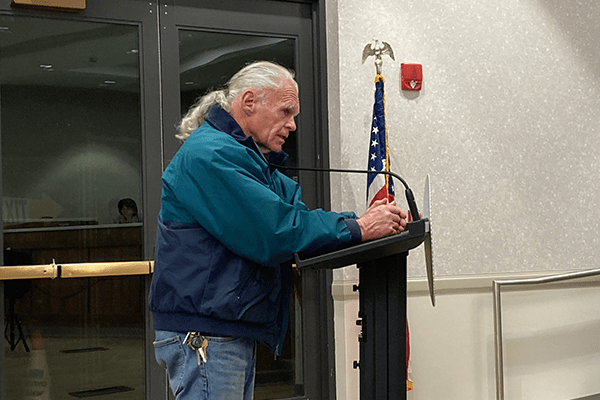|
RCBJ-Audible (Listen For Free)
|
There Is Little To No Consensus On The Proposed Zoning Text Amendment To Re-Open Rockland Cider Works
By Tina Traster
The question over whether Van Houten Farm will resurrect its cidery operation as spring approaches hangs in the balance as the Town of Orangetown continues to hold contentious public hearings that pit Rockland Cider Works’ effort to get a text amendment to the zoning code and a special permit against adamant neighbors who oppose the zoning change.
The Van Houtens say, “no one will buy the farm to be a farm,” and he’s likely correct about that.
By all accounts, public comments at the January 23 Town Board meeting unleashed anger and frustration from both sides, hoping public officials would once and for all take a stand on the subject. The fight over allowing Rockland Cider Works to legally operate a cidery on Sickletown Road in Pearl River stretches back to November 2020 during the COVID pandemic. The cidery was an oasis for many to gather outdoors safely. But it scaled up fast and became a nuisance to neighbors, including an adjacent horse farm, Silver Rock Farms, due to amplified music, noise, parking, and discourteous patrons who forgot their manners.
For nearly three years, the battle unfolded in courtrooms – and the cases are still pending in lower and appellate courts. But the focus shifted back to the Town of Orangetown last year when Rockland Cider Works and the Van Houten Farm Trust hired a consultant to submit a proposal seeking a text amendment to the town zoning code that would allow agritourism, wineries, cideries and other agricultural uses by special permit on any five-acre-plus property in a residential R-40 or R-80 district with many restrictions on setbacks, lighting, parking and accessory uses.
Last month, after two hours of public comment, Town Supervisor Teresa Kenny told the addled crowd there would be no vote on the text amendment, indicating she is not in support of the text amendment as it stood.
“No one has a right to a zone change, there is no legal right,” said Kenny. “Personally, I would like to see compromise, way less than there is in this draft, an overhaul. Maybe start all over again.”
In an email sent the next day, Kenny said, “there are five board members with very different opinions about how much sales for on-site consumption of alcohol in a residential zone is reasonable (putting aside the music and food trucks for the moment).”
Kenny also said, “I am meeting with Councilman Jerry Bottari later today because, as he stated last night, he is leaning more with me on this matter. We will jointly decide what we are willing/can agree to on this issue and will present it to the other Town Board members. They can decide from there how they want to proceed but, as you know, it only takes three (subject to the need for a supermajority for any override of County Planning conditions, if any).”
The board had scheduled another hearing for February, but Darin and Elizabeth Van Houten of Rockland Cider Works asked for the hearing to be moved to March 19th.
The Van Houtens say they’re continuing to meet with town officials to try to satisfy their concerns. Meanwhile, what’s apparent from heated public commentary is that much of what is said is subjective, and sometimes not entirely accurate.
WHAT’S FACT: Let’s begin with the current zoning on the 7.1-acre parcel. The agricultural property, which has been used for farming and hothouse growing since the 1940s, is situated partly in the R-80 zoning district and partly in the R-40 zone. For most purposes, there is no difference between uses permitted “as-of-right” in either zone. The Town Code “use table” allows for single-family detached houses, commercial agricultural operations, churches, and similar places of worship (including parish houses and rectories), schools of general instruction, and schools of religious instruction.
“No one has a right to a zone change, there is no legal right,” said Kenny.
Based on the current zoning, nursery schools and day camps are conditional uses if approved by the Planning Board. Agency group homes and agency boarding homes are allowed by a Town Board Special Permit.
The Van Houtens say “no one will buy the farm to be a farm,” and they are likely correct about that.
WHAT’S FUZZY: Some residents fighting in favor of the cidery operations have suggested that if the land is sold, it will be ripe for large-scale, multi-family housing. However, a developer would need to get many variances, a text amendment, or have the zoning changed on those parcels.
WHAT’S FACT: Many residents allege the Van Houten property is not a farm but that is a distortion. The United State Department of Agriculture defines a farm as “any place from which $1,000 or more of agricultural products were produced and sold during a calendar year.
The Van Houtens produce roughly $10,000 worth of crops, mostly cherry and round tomatoes, in greenhouses on site. They also grow potted roses, perennials, hydrangeas, and other ornamentals. Additionally, they grow crops on a 200-acre Pennsylvania farm and sell them at both the New York City farmers’ markets and on the farm in Pearl River. For the past three years, the farm has been perfecting the production of strawberries. However, apples are not cultivated on site. “There’s nothing new about truck farming,” said Darin Van Houten. “Since the 1950s, farmers grow in one place and sell it at retail outlets on the farm.” If Van Houten sells the land, Orangetown will lose this remaining tract of open space.
WHAT’S FUZZY: Opponents say the “farm” is really just a garden center. Neighbors scoff at the cidery’s campaign to “Save the Farm.” One resident, Charlene Reynolds at the public hearing said, “Save the Farm? There’s no farm. There never was. It’s not a farm. But Jim Van Houten, who also spoke, talked about how his father, who started the farm, once ran a dairy operation on the land. “It was a retail dairy,” he said. “I remember he delivered milk. And there were strawberries and cream for a dollar.” The elder Van Houten, Darin’s uncle, also said “no farm is gong to survive unless it changes.”
WHAT’S FACT: Jim Van Houten has leased more than two acres of land to the south of Van Houten farm to Laura Butti Mason, who runs Silver Rock Farms, since 1992. Mason has three more years on her lease. The farm, which has 42 horses, ponies, and a donkey, offers lessons and boarding, as well as camps for riders. The facility, which operates from 6 am to 6 pm, is one of the few in the county to provide an equestrian therapy program. Mason has not been approached by the town board for input or feedback on the cidery operations and she has not appeared at a public hearing. Mason inherited the horse farm from Jim Houten’s late wife and built the business. She told RCBJ “I want to continue the farm; I love what I do.”
WHAT’S FUZZY: It’s unclear how much impact the cidery had on the horses when it ran at full tilt but there has been testimony from people who work or spend time at Silver Rock Farms that say the cidery cannot co-exist with the horse farm. Several have testified that during the cidery’s heyday, horses were spooked by loud noises, screams and the smell of fire pits and barbeques. One witness said at least two children had been thrown from horses during lessons, but Mason could not confirm this.
Additionally, many fighting the cidery do not believe the Van Houtens will sell their land, but if they do, they say it would include the entire parcel, which may mean the loss of the horse farm.
WHAT’S FACT: Sharon Van Houten lives with her husband Christopher and family in a house on the Van Houten property that is owned by the Van Houten Farm Market trust. The couple have been trying to stop the town from hearing or advancing the zoning text amendment, saying ongoing litigation should preclude the town from moving forward. Last November, the town pulled a public hearing on the text amendment after a Rockland County Supreme Court judge issued an order temporarily restraining the cidery from pursuing its amendment before the Town of Orangetown Town Board.
Sharon and Christopher’s case suffered a setback when it was re-assigned to Justice Keith Cornell, who held a hearing on January 11, 2024, where the judge vacated the temporary restraining order. The couple appealed but was unable to secure a stay.
The couple’s case is based on their claim that they have rights to the land stemming from a family arrangement to exchange an interest in the farm for labor and services, and that their rights vested when James Van Houten sold the farm to the Van Houten Farm Market Benefit Trust, with Darin and Elizabeth Van Houten as trustees. Sharon & Christopher dispute the “record” ownership and assert that they, as “owners” of a portion of the property, do not consent to the text amendment or its presentation to the Town Board.
Last September, James Van Houten served a ten-day eviction notice on Sharon and Christopher Van Houten, though according to the Van Houten plaintiffs, he was not the owner of the property. The property is owned by the Van Houten Farm Market Benefit Trust.
WHAT’S FUZZY: Defendants say these issues had already been litigated and Sharon and Christopher’s case was already decided against them and that the complaint they filed this time should be dismissed. The court will ultimately have to decide if the sale by James to the trust, which was characterized as “between family members” and a “gift to an income only” trust constituted the type of conveyance the Van Houten plaintiffs can rely on to vest rights in the property based on oral promises.
WHAT’S FACT: The proposed text amendment calls for a limit of 150 guests,
The hours of operation would be Thursday through Sunday for onsite consumption. Specifically, Thurs (3-6pm), Friday (3 to 8 pm), Saturday (noon to 8) and Sunday (noon to 6). Any federal holiday that falls on a Monday would be noon to 7. Retail sales would be allowed Monday through Saturday 9 am to 8 pm, and Sundays, 9 to 6.
Parking requirements call for one space per employee and one space for every 2.5 guests at full capacity.
At the January hearing, attorney David Chen, who is representing Elizabeth and Darin Van Houten, told the town board 250 guests would be a more reasonable threshold for the cidery.
Generators are banned for food trucks and no live or amplified music would be permitted.
Lighting, other than security lighting, must be extinguished by 9 pm.
WHAT’S FUZZY: It remains unclear whether the Van Houtens and the town can reach consensus that satisfies all parties. But Kenny in an email the day after the January hearing wrote: “I personally found the neighbors very compelling last night, certainly more so than the people who favor it who live in New Jersey.”















